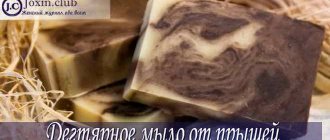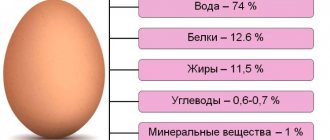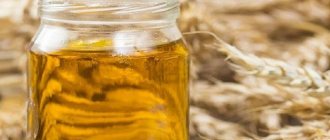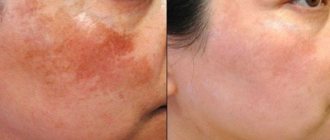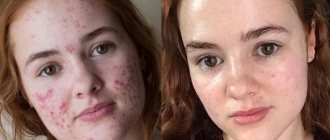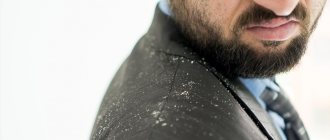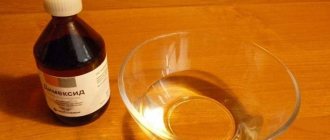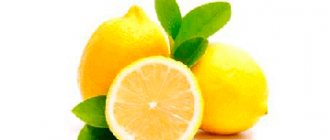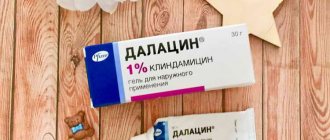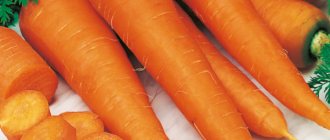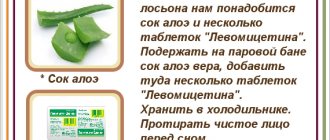Antibacterial acne soap is not the best option to get rid of acne. Especially if the rash appears on the face.
Why don’t cosmetologists from almost all over the world recommend using this affordable and simple remedy in the treatment of acne? After all, it would seem that it is designed to kill germs and bacteria. And pimples and acne in most cases appear precisely for this reason.
Most often, antibacterial soap contains triclosan
.
In rare cases, another component can be read on the packaging - triclocarban
.
Triclosan is a substance that was obtained in 1965. Since then, it has been the most popular component of almost all antibacterial soaps - both expensive and cheap.
What is its effect? Triclosan actively affects the enzyme that helps microbes and bacteria create their shell. As a result of exposure to triclosan, this wall does not form and everything harmful on our skin dies.
But the fact is that a great many beneficial bacteria also live here, which are recognized to protect our body. However, triclosan does not know how to separate harmful and beneficial and destroys everything.
Because of this, our skin becomes completely defenseless against the environment. This is why there is such a strong feeling of tightness and even peeling after just one use of antimicrobial soap.
Of course the advertisement doesn't mention this. And if you have never used antibacterial soap before and decide to try it, then after the first use you will most likely put it on the top shelf and forget about it.
Triclocarban has almost the same effect.
What scientists say
Antibacterial soap for acne will not only do no good. But it can be dangerous for the entire body. Therefore, in the treatment of acne, whether it is located on the back or on the face, you should use specialized products.
In 1998, the authoritative scientific journal Nature published a sensational article. It stated that triclosan, when used frequently, can cause mutations in many microbes and bacteria. This is the cause of a wide variety of dermatitis and allergic diseases of the epidermis.
And in the recent past, scientists from America have proven that antibacterial soap does not have any significant benefit. If you use it day after day, persistent microbes will soon appear on the skin. And they will not be sensitive to triclosan, as well as to other antibiotics and antimicrobial substances.
And finally, scientists from England came to the conclusion that living in sterile cleanliness is very dangerous. This makes a person’s immune system weak and also causes all kinds of allergic reactions.
Recipes for masks to remove blackheads
Protein-sugar mix
Ingredients:
- raw egg white;
- granulated sugar (1 tbsp).
Mix the egg whites and sugar in a clean bowl until no sugar grains remain. You can rub granulated sugar along the sides of the cup to make the paste more homogeneous. Apply approximately half of the resulting mixture to problem areas with blackheads. If your skin is oily, spread the mask over your entire face. If you have dry skin, this should not be done.
After a little while, you will feel that the mask on your face begins to dry out, and a feeling of skin tightness appears. At this point, place the remaining mixture on top of the drying mixture. Using your fingertips and palms, start patting your face. During such a massage, the mixture, sticking to the fingers, will draw out their contents from the pores.
When the mass stops sticking, wash it off your face with clean boiled water. Dry with a soft cotton towel. After such an active procedure, the skin requires additional gentle care. Therefore, complete the massage with moisturizing, choosing products according to your skin type.
Protein and sugar against acne
Coffee-oat scrub
A homemade scrub will help clear pores of greasy black plugs.
Ingredients:
- oatmeal (1 tsp);
- salt (1/2 tsp);
- coffee grounds (1 tsp);
- sour cream (1 tbsp).
Before you start mixing all the ingredients of the future scrub, grind the oatmeal. The flakes should form flour with large particles. Carefully squeeze out excess moisture from the coffee so that the salt in the mixture does not dissolve, but remains in a crystalline state. Mix the above ingredients in a cup until you get a soft porridge. If its consistency is too liquid, then add a little ground oatmeal.
Lubricate the areas with comedones with the resulting mixture. You can make separate gauze bandages and place them on problem areas for a few minutes. When wiping your face with the mixture, be careful not to harm yourself. You can scratch an already damaged face with salt or coffee. The mass should easily “remove” dead cells without disturbing the skin, but opening access to the contents of the pores.
After cleaning, wash with boiled water, thoroughly rinsing off the remaining mixture so that no salt particles that irritate the skin remain. Lubricate your face with cream or suitable cosmetic oil.
Soap and salt baths
Supplement simple washing with boiled water with saturated salt baths. To do this, add a little salt to a heavily soaped cotton swab (sponge). Table salt must be very fine so as not to scratch your skin. To clean pores in this way, it is advisable to steam your face a little first. Or do the procedure in a bathhouse, sauna or shower.
Using a swab, use gentle circular movements to wipe the areas where you have accumulated blackheads. Don't press too hard. Salt will “corrode” the skin a little, allowing the pores to open, and soap, like an antiseptic, will treat them from the inside and prevent bacteria from developing.
The massage should be short, about two minutes, no more. Then wash your face with cool water, rinsing off any remaining foam and salt. Be sure to soften your face with a lotion or cream selected for your skin.
Glycerin lotion with lemon juice
If you have glycerin in your cosmetic bag or home medicine cabinet, then together with citric acid it will serve you well in the fight against acne.
Ingredients:
- glycerin (2 tbsp);
- lemon juice (1 tbsp);
- “mineral water” (4 tbsp).
Mix the ingredients listed above. You will end up with about a third of a cup of liquid lotion. Wipe the surface of your face where blackheads have formed three times a day. The composition of the mixture is selected in such a way that in addition to cleaning pores and dissolving comedones, moisturizing, softening the skin, whitening, and brightening the face are also added.
How to use antibacterial soap correctly
We found that antibacterial soap does not have any significant therapeutic effect on acne-prone skin.
However, if you still want to use antibacterial soap, try to adhere to some mandatory rules:
- Use it only for washing your hands and no more than 2 times a week.
- Be sure to change the type and brand of soap every few months. This helps not to cause persistent addiction in microbes.
- After lathering, the soap should not be washed off for 30 seconds. This is how long it takes triclosan to start working.
- Antibacterial soap should be washed off hands with extreme care.
Before using antibacterial soap to treat acne, consider using a safer method. For example,
Cleanliness is the key to healthy skin. It is no coincidence that one of the first means of combating rashes on the face is soap. But a regular cosmetic product is not for everyone. Firstly, an allergy to fragrances may develop. Secondly, simple soap dries out the skin, exacerbating the acne problem. What product should you choose in the fight for healthy skin? There are several options worth considering.
The use of soap and its varieties
To keep your facial skin always clean and well-groomed, you can use anti-acne soap. It not only helps people maintain personal hygiene, but also allows them to cope with skin inflammation, various rashes and acne. Currently, there are quite a few types of soap that help get rid of acne on the face. But the main ones among them are the following:
- economic;
- tar;
- children's;
- volcanic.
Anti-acne laundry soap
It can be found less and less often in the everyday life of modern housewives. There are many products on sale that allow you to quickly remove any stains. And no one even thinks about using laundry soap for acne. Is it possible to replace special gels and foams with a product with a specific aroma? In fact, this is a unique remedy that allows you to fight bacteria and other pathogens that cause inflammatory processes in the skin.
The advantage of laundry soap is that it consists entirely of natural ingredients. It is impossible to detect parabens, fragrances, dyes and other elements that can cause an allergic reaction in its composition.
After washing with laundry soap, conditions are created on the surface of the skin that are completely unfavorable for the development of bacteria. As a result, the epidermis is cleansed, and existing inflammations quickly disappear. If you believe the reviews, the soap copes with acne no worse than advertised expensive cosmetics.
Household soap has a bactericidal effect, that is, it acts as an antiseptic. The product perfectly removes accumulated fat, dust, and keratinized particles from the surface of the skin. Existing pimples quickly dry out, and the risk of new acne is significantly reduced.
Laundry soap is one of the best remedies against acne
Laundry soap has a huge number of advantages. The price of one piece does not exceed 20 rubles. At the same time, the product does not have an expiration date; it can be stored at room temperature. In addition, the soap is convenient to use.
Despite the large number of advantages, laundry soap for acne also has disadvantages. It is worth considering that, together with dirt, the product removes the protective fatty layer present on the skin of the face. Therefore, it is recommended to wash your face in the usual way using the product no more than twice a week. After it, it is recommended to apply a moisturizer suitable for your skin type to your skin.
Features of using laundry soap against acne
There are 3 main ways to use laundry soap for acne:
- Washing. The easiest way is to wash with soap foam. It helps get rid of dust, germs, dirt and bacteria that cause acne on the face. But along with harmful substances, laundry soap also removes sebum, which is a kind of protective layer. Therefore, you can wash your face with it no more than once a week to avoid dryness and flaking of your facial skin.
- Local application. Because of/. Since alkali is an aggressive substance that can harm healthy skin, it is better to use soap foam locally, that is, applying it only to inflamed areas of the face. Then it will dry out acne, relieve inflammation, normalize the functioning of the sebaceous glands, but will not have a negative effect on healthy areas of the skin. The soap should be applied pointwise to the face using a cotton swab. Just whip up some foam, dip a cotton swab in it and apply it to the pimple or acne. As a rule, this procedure is done before bed, and by the morning it is already clear that the inflammation has decreased and the pimple has dried out.
- Masks. Masks with laundry soap are a good way to deal with acne on the face. There are many options, but among them there are a few that are truly effective.
Non-standard ways to use laundry soap
Classic washing is not the only option for using a bactericidal agent. If the pimples on the face are single, you can apply the product pointwise. All you have to do is scrape out a small amount of soap and add a drop of water to get a sticky consistency. The finished paste is applied to the inflamed areas after washing. It is better to do the procedure before bedtime. The next morning, the soap is removed with a damp cloth. As a rule, inflammation becomes less pronounced overnight.
Extra mask is another option for using soap. While taking a bath, apply the product to a washcloth to create a thick foam. The resulting product must be applied to the inflamed areas for 15 minutes, then rinsed with water.
While taking a bath, soap can be applied to the face as a mask.
You can cleanse your skin more deeply if you use laundry soap and baking soda. Grate a small piece of cleanser on a coarse grater, add a little water to the container and stir well to obtain a thick foam. You should also add a teaspoon of baking soda and mix everything thoroughly. The resulting mixture is applied to the face for 30 minutes, then washed off with warm water and moisturizer is applied. You should make this mask no more than once a week.
Laundry soap masks for acne
- Salt mask. To prepare a mask with salt against acne, you need to grate a piece of laundry soap, add a little warm boiled water and whip up the foam. Then mix with salt in a 1:1 ratio, mix and apply to the face. After half an hour, rinse with warm water. After washing off the mask with salt, it is recommended to conduct a contrast wash with warm and cold water to improve blood circulation. This mask can be used up to 3 times a week.
- Onion juice mask against acne and oily shine. You will need to grind a piece of laundry soap, add warm boiled water, stir until smooth, leave for 5 minutes, then add 1 tablespoon of onion juice and beat the resulting mass until thick foam. Apply this foam to your face in a thick layer. After 10 minutes, rinse with warm water. When applying the mask, a burning sensation may occur, you should not be afraid of this, this is how the natural process of cleansing the pores occurs. After washing off the mask, apply day cream to the face.
- Mask with sea buckthorn oil. It is necessary to mix crushed laundry soap and sea buckthorn oil dissolved in water in equal parts, apply the mixture to the face for 20 minutes, then rinse with water.
- Peeling mask - helps fight pimples, acne, and also renews dead skin layers of the face. Moreover, you do not need to prepare this mask, just whip up the soap foam and spread it over your face using a sponge or sponge, then treat it with a cotton pad soaked in calcium chloride.
Tar soap against acne
Like household oil, it is quite effective for acne. In fact, tar soap is very similar in composition to the previous product. The difference is that it contains about 10% pure tar. And this element itself has healing properties. Tar is an excellent antiseptic that has virtually no contraindications. In addition, this substance accelerates tissue regeneration, which means it slows down the aging process. That is, tar soap can be used not only in the fight against pimples, but also to preserve youth.
Like laundry soap, tar soap dries the skin quite strongly. Therefore, you need to wash your face with it no more than twice a week. It is also worth considering that the product has a specific smell. It is recommended to use it before bed so that you can easily apply makeup in the morning. Overnight the aroma of tar disappears.
Tar soap helps relieve skin inflammation
Compresses made from tar soap are also considered effective. On sale you can find the product in a liquid version, which is more convenient to use. It is recommended to apply a small amount of liquid tar soap directly to pimples (spotwise) and leave for several hours, then rinse with warm water. After the first procedure, the inflammation will become less noticeable.
Why soap kills coronavirus
The new Chinese COVID 19 is an RNA virus that does not have its own cellular structure. However, with an extremely simple structure, the pathogen still has protein and lipid membranes; they are necessary for successful attachment to the host cells.
Any soap contains alkali, which quickly destroys fats. If the coronavirus gets on the skin, then when you soap your hands, its lipid membrane will be destroyed, and the pathogen can simply be washed off. Among disinfectants, soap bars are one of the most effective, affordable and easy to use. In terms of effectiveness, they are not inferior to 60% alcohol, but their effect on the epidermis is much more gentle; usually the skin does not begin to dry out and crack from regular treatment.
According to the rules, you need to spend at least 20 seconds washing your hands. Tip! To protect against coronavirus, you can wash your face with soap, including after returning from the street, while alcohol wipes and antiseptics are not recommended for this.
Making tar soap at home
You can be sure of the quality only of cosmetics that you make yourself. You can create excellent tar soap with medicinal properties without much difficulty at home.
To prepare the product, you need to buy a piece of laundry soap and a little birch tar from the pharmacy in advance.
The soap should be melted in a water bath and tar should be added in a 1:1 ratio. The composition must be thoroughly mixed.
Soap can be given any shape. In a few hours the product will harden and be ready for use.
The good thing about this home remedy is that it contains birch tar in a higher concentration. This means that such a product will have more medicinal properties.
Soapy cleaning of problem areas
Many people have forgotten or did not know that ordinary soap is in itself a fairly strong means of fighting acne. Depending on your skin type, you can choose the appropriate soap with or without additives. You can buy handmade soap, but from trusted soap makers, otherwise instead of causing harm, you may cause irreparable harm to your face.
Baby soap
First of all, look at the factory-made children's soap . Its big advantage is that it contains a minimal amount of additives that can only provoke additional skin problems.
As a rule, baby soap is white. This means that there are no dyes in it, except, perhaps, titanium dioxide. Perfume fragrances, if used, have a mild aroma so as not to cause allergic reactions. But there are more skin softening substances in baby soap than in others. In the composition you will find glycerin and lanolin - skin moisturizers. And pay attention to the pH - neutral, suitable for the skin.
You can wash your face with this soap in the morning and evening, but it is advisable to soap only problem areas where acne has clearly manifested itself. After washing your face, pat dry with a towel; you can use a non-greasy cream or cosmetic milk
Tar soap
Tar soap is heavy artillery that hits blackheads without missing a beat.
Birch tar in folk medicine is a magical substance. An antiseptic of natural origin was used by our ancestors in the fight against many diseases. Even those caused by small parasites.
If you are not afraid of an unpleasant (to say the least) aroma, then buy tar soap. After washing, the skin calms down and itching decreases.
But do not forget that when using tar soap you need to stop using scrubs - the skin will be too dry to withstand this procedure.
Sulfur and boric soap
Sulfur soap: a therapeutic and hygienic product . It dries the skin very much, despite additives such as olive oil. It cannot be used in the following cases:
- during pregnancy;
- nursing mothers;
- for open wounds and ulcers.
Another medicinal soap is boric soap . You can find it in pharmacies. It is similar in effect to sulfur and has the same limitations.
Laundry soap
Many grandmothers can tell a lot about the healing effects of laundry soap. It is very drying, and this property is used to combat oily acne. It is not worth the risk for those who have dry skin, unless for spot treatment.
Lather a cotton swab heavily and wipe blackheads or oily pimples with it. Wash off after some time. If your face experiences discomfort, use a light moisturizing cream or lotion.
Soap treatment will not bring immediate changes. The result will appear only after a month or two after regular use. Complement the treatment with other folk remedies, which are described below.
Should I use baby soap?
You can often come across statements that baby soap is the best remedy against any skin diseases. It contains no components that could cause an allergic reaction. However, this product also does not have a high bactericidal effect. Baby soap is good to use for prevention when the skin is completely healthy. It will most likely not be possible to cure acne with its help.
Baby soap prevents acne
Baby soap is good because it does not dry out the skin. One of the main components is glycerin. It can be used in between tar or household products. It can easily replace cleansing milk.
Cosmetical tools
Almost every cosmetic brand has its own line of products against facial rashes. What soap helps with acne? Naomi with Dead Sea minerals is extremely popular. The soap is in the middle price category, has a pleasant aroma and copes well with inflammatory skin processes. The weight of one piece is 125 grams. This is enough to use for two to three months.
The color of Naomi's product is similar to a tar-based product. The soap is black because its main component is mud extracted from the bottom of the Black Sea. The product contains a large amount of minerals and vitamins necessary for the normal functioning of the skin. In addition, the product contains natural vegetable oils (olive, palm, coconut). Thanks to this, the soap perfectly moisturizes the skin and can be used daily.
Naomi soap is a popular acne remedy
Using Naomi anti-acne soap, you can achieve several effects at once. First of all, the cosmetic product perfectly cleanses the skin of dead particles. Dead Sea mud acts as a scrub. In addition, it has a bactericidal effect and prevents the development of pathogenic microflora. The plus is that the product is suitable for any skin type. All you need to do after using it to fight acne is to apply a nourishing cream suitable for your skin type.
What other soap to choose for acne? It is worth paying attention to products that are not specifically designed to treat acne. You can hear a lot of good reviews about Dove soap. The product perfectly cleanses the skin. It is possible to remove excess fat without drying out the face. Dove cannot cope with advanced acne. But it can be used to prevent rashes for people with problem skin.
Dove prevents acne and moisturizes the skin
The moisturizer can be used to perform salt scrubs. To do this, you need to foam a small amount of soap, add a whisper of salt and massage your face well in the area where comedones accumulate. This procedure should be done once every two weeks.
Reading time: 8 minutes.
Laundry soap today is not as popular as it was a few decades ago. It was used exclusively as a detergent for washing and personal hygiene. Now many people have completely forgotten about him. And it has many positive qualities for problem skin, as it can be used against pimples, acne and inflammation.
Korean skin care for oily skin
We need cosmetics to maintain the health, youth and beauty of our skin, as well as to solve problems.
The main problems of oily skin: • oily shine, • enlarged pores, • blackheads (acne), • post-acne marks, • lack of moisture.
Asian women have thick, oily skin. This skin type has a huge advantage. She ages later, the owners of such skin have much fewer wrinkles compared to their peers. Korean brands pay a lot of attention to caring for this skin type. Therefore, it is very easy to get lost in the variety of Korean products.
Let's start in order - with the steps of Asian care.
CLEANSING THE FACIAL SKIN
Chapter 1. Soap.
Cleansing is simply necessary and must be regular. Even if you ignore decorative cosmetics, you need to wash your face with foam or special cosmetic soap every day. Only cleansing will help us prevent the appearance of new blackheads and unpleasant oily shine.
Our customers love cosmetic charcoal soap very much. An excellent option for daily care. The top three are here:
• Secret Key Black Out Pore – soap from the “charcoal” line, a pleasant combination of quality and price. • Ciracle Blackhead soap - the brand is positioned as a cosmeceutical. More like pharmacy care. The soap perfectly cleanses the skin until it squeaks. • Holika Holika Charcoal Egg Soap is a popular egg soap. The love of buyers was due to the design and the main component of carbon absorbent.
We also recommend paying attention to the mask soap from Tony Moly and the cosmetic scrub soap with AHA acids from Mukungwa.
Chapter 2. Foam for washing.
Koreans are very fond of facial washes; there is a huge selection. We need squeaky cleansing, so we choose more powerful foams. It is more convenient to choose foam from series designed for the care of oily, combination skin. For clarity, we have collected the most famous care lines of popular Korean brands in a table.
| Brand | Line name | A comment |
| Holika Holika | 1.Skin And AC Mild Clear 2. Pig Nose 3.Skin & Pore Zero | 1. Anti-inflammatory care, narrowing pores. 2. Fight against blackheads. 3. Narrowing of pores - mask and serum. |
| Holika Holika | Soda Pore | Products for deep cleansing of oily skin with baking soda |
| Ciiracle | All products are for oily, combination and problem skin; any brand foam will do. | |
| Mizon | 1.Pore Control System 2. Black Clean Up Pore | 1. Narrowing of pores, matting. 2. Cleansing, fighting blackheads. |
| The Skin House | Pore Control | Narrowing of pores, mattification. |
| The Saem | See & Saw AC Control Deep | Control of purity and fat content. |
| Tony Moly | Dr.Tony AC Control | For the treatment of problematic skin with acne and rashes. |
Chapter 3. Makeup removal.
What is special about cleansing oily skin from traces of makeup? She doesn't need extra oils. You need to choose a product for oily and combination skin: it should help remove makeup, but not contribute to clogging of pores. If your makeup is not super long-lasting, then it is best to use cleansing wipes to remove makeup.
If you use BB or CC cream, then you cannot do without hydrophilic oil or cleansing cream to remove stubborn makeup.
Hydrophilic oil is oil mixed with an emulsifier. The oil is applied to dry skin and massaged. Don’t rush to wash your face with water right away; oils also penetrate into sebaceous plugs and help dissolve them. By adding water on top of the oil, an emulsion is formed that removes the most stubborn makeup and also unclogs pores. Then the emulsion is washed off with water.
After washing with oil, it is recommended to wash with foam or gel for washing to remove any remaining unreacted oil, or remaining impurities that have not dissolved in the oil. For oily skin, we recommend studying the composition of hydrophilic oils; it is advisable to use only natural vegetable oils. For example, grape seed oil, macadamia oil, sasanqua oil, hemp oil, tea tree oil. We recommend: 1. The Saem Natural Condition Cleansing Oil 2. Missha M Perfect BB Deep Cleansing Oil 3. Whamisa Organic Flowers Cleansing Oil
SKIN HYDRATION
Oily skin often needs moisture. Moisturizing in Korean care begins with the use of toner/toner. They usually have a gel-like structure that is denser than water. This is a necessary step in caring for any facial skin. It is better to choose toners with plant extracts that have anti-inflammatory and astringent properties. The result is moisturized matte healthy skin, narrowing pores. You can choose a toner from the same care series in which you chose the facial wash.
We can recommend popular toners: 1. Secret Key Black Out Pore Clean Toner - a toner from the carbon series, an affordable combination of price and volume. 2. Etude house Wonder Pore Freshner - toner for skin with enlarged pores, a decent bottle size of 250 ml. 3. The Skin House Pore Control powder Toner - toner with absorbent powder to create matte skin.
SKIN NUTRITION
Despite shine, density and a small number of wrinkles, oily skin needs nutrition. It is recommended to use products containing a minimum of oils. In Korean care, the ideal option would be emulsions or low-fat gels. Pay attention to the composition of the products: some vegetable oils also help close pores to retain moisture. For example, cocoa butter and coconut oil. Gels and emulsions can also be selected from series for the care of oily, combination skin, or choose a product from the range of the Korean brand Ciracle.
For the summer season, moisturizing gels with snail and aloe are ideal. Almost any Korean brand offers Shooting gel: the differences are usually in the price, the volume of the jar and the “importance” of the brand.
SPECIAL CARE
Additional care tools include cleansing face masks, blackhead removers, blackhead patches, peeling rolls, and scrubs. Useful and necessary products, but not for daily use. To prepare for an important event, an indispensable item is 3 in 1 patches for cleansing the T-zone. You can choose from Mijin (specializing in inexpensive and high-quality sheet masks), Holika Holika, Secret Key.
Special care includes cleansing face masks, medicinal serums to tighten pores, treat local inflammation and pimples, scrub masks and peelings.
The owner of oily and combination skin should have a cleansing mask in stock. For wide pores, products with absorbent components are excellent: clay, coal. It is desirable to have antibacterial plant extracts: green tea, aloe, tea tree, chamomile, calendula, etc.
The Korean brand Elizavecca has a good selection of cleansing masks. Charming Piggy selflessly fights skin imperfections in every cosmetic product of the brand. Particularly loved are the film mask for cleansing pores and the oxygen bubble cleansing mask with clay.
It’s convenient to choose a mask along with a treatment immediately in the line for your skin type, but it’s not at all necessary.
Top masks for skin cleansing:
1. Secret Key Black Out Pore Minimizing Pack
2. Elizavecca Carbonated Bubble Clay Mask
3. Lioele Pore Clean & Tightening Pack
Interesting special products for cleansing pores are warming gels. Under the influence of this product, the pores open and it is very easy to remove sebaceous plugs by lightly pressing with a special spatula, a loop or a regular cotton swab.
When choosing a product, we study reviews and recommendations, compare prices. At the same time, you can always seek advice directly from the online store. Leave a request, take a call and ask questions. It is absolutely free, helps you save time and quickly buy your cosmetics for the care of combination skin.
UPDATE
This article was published in 2020, since then new interesting brands of Korean cosmetics and surprisingly effective care products for oily and combination skin have appeared in Russia. In this regard, we invite you to familiarize yourself with the overview of care lines in a new article:
Korean skin care for oily skin part 2.
Advantages of household soap for skin
This tool has a lot of advantages. But we should list those that are important in cosmetology:
- Naturalness;
- Bactericidal property. Destroys pathogenic bacteria on the skin;
- Washing away excess sebum and dissolving sebaceous plugs;
- Low cost;
- Easy to use.
Many dermatologists recognize laundry soap as a product for use in cosmetology. But it is important that it is natural. That is, there should not be any sulfates, fragrances, parabens or other synthetic components in it.
Does soap help with acne?
Laundry soap helps get rid of pimples, acne and acne, and even boils. But it is important to understand that it does not cure. If acne is regular and multiple, then you need to look for the true cause of acne.
Often these reasons are impaired metabolism and hormonal imbalance, the presence of certain diseases, poor nutrition, etc. Soap removes the problem only for a while. Laundry soap removes pimples and acne, as it acts on the epidermis and creates an alkaline environment there. First of all, a pimple appears at the site of a pore clogged with sebum and dead cells. As a result, metabolism is disrupted, since the flow of air stops. Therefore inflammation occurs. Laundry soap breaks down fat and inflammation is relieved, and sebum production is also normalized.
The Guardian: How does soap kill the COVID-19 coronavirus, for which there is no cure?
photo pixabay.com
Viruses can remain active on the surface of the human body for hours or even days. Disinfectants, special liquids, wipes, gels and creams that contain alcohol can help get rid of them. But all of them are not as effective as regular soap.
Palli Thordarson, a professor of chemistry at the University of New South Wales, writes about this on the pages of The Guardian. She admits that her Twitter post about the above went viral. And, as it turned out, not in vain. Health authorities have two messages for people. First: if someone catches a new virus, he should not rely on medicines, because there are none. The second advises washing your hands more often to stop the spread of the pathogen. And it looks strange.
Effect on skin
When exposed to laundry soap, an alkaline environment is created on the skin. That is, pathogenic microorganisms will not infect the epidermis and, as a result, pimples and blackheads will not appear. But due to its high pH, it is not recommended for frequent use. Namely, pH – 11 units. Laundry soap has a natural composition - this is its main positive quality.
It also does not contain various fragrances and synthetic components that can cause allergic reactions, etc. Natural soap contains sodium salt and fats up to 72%. Its components effectively and quickly cleanse the skin of dust, dirt and bacteria. It penetrates the pores and removes excess sebum. This restores the normal functioning of the sebaceous glands. This can also be explained by the fact that this product is able to restore oxygen saturation of the skin. The antibacterial effect of this product on the skin allows you to remove all bacteria, thereby inhibiting the spread of infection, which provokes the formation of new inflammations, acne, etc. And also when using this soap, inflammations heal without a trace, no scars remain after wounds. Laundry soap disinfects the inflamed area of the skin and promotes cell regeneration.
Contraindications to the use of laundry soap against warts
Laundry soap is a hypoallergenic product. This means that the product can extremely rarely cause an allergic reaction. However, since such a possibility still exists, it is necessary to conduct a preliminary sensitivity test.
To carry it out, prepare a concentrated soap solution and wipe your skin with it. After 15 minutes, rinse off the composition and observe the reaction of the epidermis throughout the day. If there are no negative symptoms, the remedy can be used.
It is not recommended to use laundry soap for warts for those who have certain concomitant skin diseases. In this case, you need to contact your treating dermatologist and, together with him, determine the most competent concept for removing formations.
The product may cause discomfort during treatment to those with very dry skin; in this case, it is better to choose another product to remove warts.
It should be noted that laundry soap has a rather specific smell, which not everyone likes. In this case, you also need to look for alternative folk remedies against skin growths.
Note! If there is a possibility that the wart is oncogenic, any self-medication is strictly prohibited. In this case, a course of therapy can only be prescribed by a doctor - as a rule, oncogenic growths are removed surgically.
- See also contraindications to the use of tar soap for warts
Using Soap
Laundry soap for facial skin should be used once a week. Every day you can only treat inflammation and acne with it, that is, apply it pointwise. But there are situations when you can increase the number of washes to 2-4 times a week. This is possible with excessive sebum production and extensive acne. This soap is also effective for inflammation on the body. For those who have acne on the body, you need to wash yourself with it 1-2 times a week. It will not only make your skin clear, but will also significantly improve its condition. Reviews testify to this. After washing with laundry soap, the skin must be treated with a moisturizer so that it does not become dry. In addition to washing, you can also make masks that include soap, but they are only suitable for oily skin. And they need to be applied to a clean dermis.
This product can only be used spot-on for dry skin; washing should be avoided. Using it only in problem areas will dry out acne and break down sebaceous plugs.
When using soap to cleanse your face, you need to carefully monitor the condition of your skin. If you can see that pimples and acne are healing, then this method is great. But if the skin is too tight and discomfort is felt, then you need to stop using soap for cosmetic purposes. This can only mean one thing - the skin is exhausted and dehydrated. For acne on the body, laundry soap is also suitable; you should wash with it.
After this, the condition of the skin will improve and the acne will heal. However, when using soap, it is not recommended to lather with a bar. It is better to lather your hands until a thick foam forms and apply it to the body with massage movements. Another way to improve the condition of your skin is to add soap to your bath.
Safe use
As with any other product, it is important that it is used safely. To do this, it is important to follow several rules:
- You should not wash your face with laundry soap more than three times a week, and if your skin is dry, once a week is enough;
- After the procedure, it is necessary to apply nourishing milk or cream;
- Soap can be used as a body cleanser no more than once every two days;
- The mask can be applied to the facial skin maximum once a week.
If you follow these recommendations, reviews about this method of combating skin imperfections are the best. If a woman washed her face this way for a month, she was guaranteed to get rid of acne and blackheads.
Whether it is possible to use laundry soap for skin problems depends solely on compliance with these rules. When used correctly, it will remove fat plugs and even out the process of fat production by the skin.
Thus, laundry soap against acne is a natural, inexpensive and truly effective remedy. It eliminates skin imperfections with just a few uses per week.
Mask recipes
A quick and effective mask without additives: you just need to apply a thick foam from soapy hands only to the affected areas. Wait for it to dry and rinse with water. This can be done while taking a bath.
Salt mask
The bar of soap needs to be grated and diluted in warm water, foam should form. It needs to be removed and mixed with table salt. The ratio should be the same. Apply the mixture for 10-15 minutes. After this, wash your face. This mask should be used once every 3 days. Course 3 weeks.
Onion mask
This mask should be used for very oily facial skin. To prepare it, use soap, warm water, and onion juice. Grind half the bar and dissolve it in warm water. You should get a homogeneous mass. Then you need to leave it for 5 minutes. And only after that you need to pour 1 tbsp into the mixture. spoon of onion juice and stir until foam forms. The resulting mixture is applied to the face in a thick layer for 10 minutes, but the skin should be clean. Next, rinse your face with warm water.
After applying the mask with onions, you will feel discomfort and burning. This is due to onion juice that penetrates into the pores. It is also effective to carry out a light massage at this time.
Mask for problem skin areas
Laundry soap should be grated and filled with hot water (1 cup). Everything needs to be stirred and placed in a water bath. Once a homogeneous mass has formed, remove from heat and cool. After that add:
- Camphor alcohol – 1 tbsp. spoon;
- Hydrogen peroxide – 1 tbsp. spoon;
- Ammonia – 15 drops.
Mix everything thoroughly and apply the mixture to problem areas of the skin. Leave for 15 minutes. You need to wash your face with water and vinegar. Proportion: add 1 teaspoon of vinegar to 1 liter of warm water. Another such mask is a mixture of household soap (about 30 g) and hydrogen peroxide 3% (5 drops). You need to rub the soap and add a little water and peroxide, beat the foam. Before applying the mask, you need to lubricate your face with aloe juice. Next, apply the mixture to your face for 5 minutes. This mask can be used both on the entire face and on problem areas.
Mask against blackheads
A cotton swab should be soaped with laundry soap and sprinkled with soda. Next, using massage movements, you need to treat the places where there is a cluster of blackheads. After this, wash with water. You can also wash your face after this with a decoction of herbs or simply wipe your face with an ice cube made from herbal decoctions.
Masks with laundry soap are not suitable for dry skin. They can be used only for oily dermis, or on the T-zone of the face.
Other uses
In addition to washing, tar soap is often used to make masks. A mask with tar intensively treats inflammation and eliminates acne. If you need a spot treatment for skin imperfections, be sure to try one of the following recipes.
Each recipe contains a detailed description of the preparation process, recommendations for application and frequency of use. Please note that any of these products must be prepared for one use. During storage, the beneficial properties of homemade masks are quickly lost.
Classic anti-inflammatory mask for problem skin
The mask recipe is very simple. Whisk a small amount of soap into a thick foam and apply it to a cleansed face. If the skin lesions are significant, apply it to the entire surface of the face. If you are worried about just a few pimples, use it spot on.
For dry skin, you can add a little sour cream or cream to the foam. The moisturizing component will keep the skin soft and prevent tightness. Keep the mask on for 15 minutes, then rinse with warm water. Use once a day until complete healing.
Brightening mask against pronounced blackheads on the face
This recipe is created specifically for faces with clusters of blackheads. The mask includes soap and soda. This combination can act on the deep layers of the skin, cleansing pores and giving the face a healthy and fresh look.
Grate a small piece of soap. Place the shavings in warm water and beat into foam. Add a pinch of salt and massage in, avoiding the lips and eye area. Leave for a few minutes and rinse with warm water.
Deep cleansing mask with herbal decoction
This recipe is very similar to the previous ones. The only difference is that the soap foam is whipped not in water, but in a herbal decoction. It can be used for any skin type by selecting suitable herbs. Calendula and eucalyptus are great for oily skin. Chamomile will soothe dry and sensitive skin, while yarrow and St. John's wort are recommended for normal skin. Apply the mask to a clean face for 10 minutes, then rinse. It helps to cope with comedones caused by insufficient cleansing.
Disadvantages of Using Soap
In addition to all the positive qualities of laundry soap, it can be harmful to the skin. It is not recommended for people with dry and sensitive skin to wash their face with it, as it dries out the epidermis. Due to the influence of the active components of the soap, sebum is removed, and, accordingly, the protective film. The skin becomes dehydrated and peeling, itching and new inflammation may appear. Let's summarize:
- Increased alkali removes the protective fatty film from the skin;
- Overdrying of the epidermis. This happens if you use soap to wash your face daily;
- Due to dryness, discomfort appears: peeling, itching, redness, tightness of the skin;
- The effect in treating acne is temporary, since the soap does not remove the main cause of acne.
There is an opinion among people that there is nothing better than antibacterial soap for washing your face against acne. And acne goes away, both cheaply and cheerfully. This assumption is completely wrong. You should never wash your delicate facial skin with regular hand soap. It washes away bacteria so harshly that it destroys the skin's natural protective film, dries out the skin and causes the sebaceous glands to work to death.
Composition and properties of laundry soap
Laundry soap contains only natural ingredients, the main one of which is alkali. It is this that creates a protective environment that prevents the proliferation of pathogenic bacteria that cause acne on the face and body.
The main positive properties include:
- Removing dirt, dust and germs from the face and body
- Getting rid of inflammatory processes
- Restoration of the sebaceous glands
- Healing marks and scars after acne
Negative properties include the ability to greatly dry the skin, so it is not recommended for use by those with dry and sensitive skin.
Does soap help with acne?
Conventional antibacterial soaps are absolutely not suitable for facial skin. They are designed to kill germs that can get on your hands and body. Of course, such bacteria also often come onto the face from the hands, but not in such quantities and not so often. Although triclosan is most often added to antibacterial soap, and this product can also fight acne bacteria. But then a different question arises, due to the addition of alkalis, dyes and fragrances to soap, some types of soap turn into a walking nuclear disaster for our body, not to mention our faces. It is because of the addition of synthetic substances that allergic skin reactions to these industrial products occur.
But even if you choose natural facial soap, due to its alkali content, it will dry out the skin greatly. Here it is better to opt for. The basis of tar soap is birch tar - a natural antiseptic and blood regenerator, i.e. creates blood flow to tissues. Often, after washing with tar soap, the face becomes a little pinkish for this very reason. To treat acne, you should wash your face with this soap 2 times a day: morning and evening.
Rules for using laundry soap for acne
Since laundry soap consists of 70% alkali, and it, despite all its beneficial properties, is an aggressive substance, this remedy against acne on the face and body should be used according to certain rules:
- For a small number of rashes, soap foam is used no more than once a week; if necessary, only damaged areas of facial skin are treated with it every day.
- To avoid drying out and dehydration, after washing, it is important to treat your face with moisturizer.
- Laundry soap is also used against acne and other rashes on the body; it replaces shower gel and washes 1-2 times a week.
- It effectively helps improve the condition of oily skin, fights vein blockage, and can be used 2-3 times a week.
- Not suitable for those with dry skin.
- Those with problem skin are advised to apply the product locally, only to damaged areas of facial skin.
- Another important point is that any creams can be applied no earlier than 20 minutes after using laundry soap.
What soap to choose for washing acne
In addition to tar soap, there are many washing gels created specifically for problem skin without the addition of synthetic substances, but with the addition of antiseptics, thermal waters, mineral elements, etc. Try to choose any facial products that are labeled “non-comedogenic,” which means “will not clog pores.”
A very soft and gentle cleanser from Uriage - even used to bathe babies. Thermal water, minerals, moisturizing and cleansing agents are an ideal composition for acne-prone skin. There will be no allergies, there will be no drying, but there is a strong fight against pathogenic microorganisms.
A good product for dry or overdried skin from Avene with the addition of antiseptic zinc gluconate, coconut and jojoba oils, and thermal water. Eliminates peeling and inflammation, ideal for sensitive facial skin.
Also pay close attention to the Noreva Exfoliac series cosmetics, specially designed for problem skin with acne. Wash gels, masks, creams, camouflage pencils and other attributes of beautiful skin.
Acne can appear at any age for various reasons. You don't have to spend a lot of money to get rid of them. For inexpensive and effective treatment of acne, it is recommended to use soap.
Everyone can choose the one that suits their composition and properties. Some types have been known for decades, while others have been developed recently. Each of them has its own advantages and disadvantages. Taking them into account, you will soon notice the result.
Varieties and properties
You can choose the right acne soap for any skin.
When choosing, you must be guided not only by your skin type (oily, normal, dry), but also by your condition (sensitive, dehydrated, irritated, age-related).
Degtyarnoe
The composition includes 90% laundry soap and 10% birch tar.
There is nothing else in natural tar soap. The unpleasant smell disappears a few minutes after washing.
Accelerates skin renewal, promotes scar healing and eliminates acne spots.
Economic
Acne removal is based on a very alkaline soap.
Microbes cannot survive in such conditions.
It should not be used frequently; there is a risk of drying out the skin. The completely natural composition does not pollute the body with harmful chemical compounds. It is made on the basis of fatty acids and potassium or sodium salt.
Sernoe
To treat acne, the composition must contain at least 10% sulfur.
It has disinfectant, antifungal, anti-inflammatory properties.
It is better than others for dry skin, as it contains moisturizing components: natural oils and aloe extract. Salicylic acid in the composition dries out acne.
Video: Details
Bornoe
Disinfects the surface of the skin, eliminates fungal and bacterial microorganisms due to boric acid.
Glycerin seals and retains moisture on the surface of the skin. Mink oil moisturizes it and promotes deep penetration of nutrients into the skin.
Eliminates the hardness of tap water, lightens post-acne. Helps get rid of even large inflamed and painful pimples.
Thai and Chinese
Madame Heng's Thai soap is suitable for sensitive, dry and dehydrated skin.
It does not contain sulfates and uses sodium palmitate as a detergent component.
It contains a large number of plant extracts, essential oils and other natural ingredients. It has antiseptic, anti-inflammatory, soothing and sebum-regulating properties.
Chinese Manting soap eliminates acne, fights subcutaneous mites and other microorganisms. It soothes and restores water balance. Reduces sebum production and tightens pores.
Most of the ingredients are Chinese medicinal herbs.
The soap contains a hormone that fights demodicosis.
Volcanic
A unique soap made from volcano ash acts as an adsorbent.
It is made from crushed magma from the Waunatu volcanoes.
It absorbs all dirt, dust, and sebum. In return it gives away many useful substances. The product improves and evens out complexion, fights microorganisms that cause acne. Volcanic clay in the soap relieves inflammation and whitens. Aloe juice and coconut oil moisturize the skin. Black cumin extract makes the skin smooth and elastic.
Glycerin
Soap cleanses all layers of the skin well from impurities, this prevents the appearance of new rashes.
It relieves inflammation, has antibacterial and disinfectant properties.
Glycerin creates a moisture-retaining film on the skin, so you can use this soap every day. Natural ingredients in the composition promote hydration.
Shungite
It does not dry or dehydrate the skin, eliminates acne and the causes of their occurrence.
Absorbs heavy elements and brings them to the surface. Cleanses pores deeply from the inside, “pushes out” blackheads.
The product restores damaged skin cells. Fills them with a variety of vitamins and microelements. Soap cleans and softens water.
Salicylic
It copes well with acne and excessive sebum production.
Deeply cleanses the skin and tightens pores. Salicylic acid exfoliates dead cells and renews the skin.
Not suitable for dry or dehydrated skin due to salicylic acid. Glycerin in the composition promotes hydration, oily skin will not feel tight after washing.
Coniferous
The completely natural composition destroys bacteria and relieves irritation.
Soap has antioxidant properties and removes all impurities and toxins from the skin. Prevents recurrence of rashes.
Pine needle extract has a calming effect, sea salt reduces fat secretion. Suitable for irritated skin. Natural oils soften and moisturize the skin without dehydrating it.
Safeguard
After use, the feeling of freshness lasts for a long time. Aloe extract moisturizes and soothes the skin.
Dove
The product contains emollient components and is suitable for any skin type.
Very gently but thoroughly removes dirt. Prevents the appearance of new acne and fights existing ones.
The skin becomes soft, smooth and elastic. The complexion is evened out, burning, itching, and irritation go away.
With celandine
Celandine extract relieves inflammation and eliminates harmful microorganisms.
Dries and reduces acne. Freshness after washing lasts for a long time.
The presence of oils and vitamins A, C helps nourish and soften the skin. The face does not dry out or become dehydrated.
With salt
The main component is sea salt, which disinfects the skin of the face and quickly removes small pimples.
Salt accelerates the healing of wounds and acne scars. It acts as a scrub, so you can wash your face with it 1-2 times a week.
Cosmetic base and essential oils soften and moisturize the skin, giving the face an even color.
Does it help with blackheads?
Using laundry soap improves the condition of the skin, eliminating unpleasant acne. This is due to deep cleansing of the skin, exfoliation of its keratinized particles and relieving the inflammatory process in the epidermis. To quickly get rid of blackheads, it is recommended to use laundry soap as masks and peels.
Extra mask
An extra mask will help you achieve a quick positive effect with minimal effort and time. The product contains hydrogen peroxide, which has the property of mechanically cleansing contaminated skin surfaces and quickly pushes out sebaceous plugs.
To prepare an extra mask, add a few drops of pharmaceutical grade 3% hydrogen peroxide to the soap solution. Stir everything, apply to the skin for 3 minutes, then quickly rinse with warm water. The mask has a strong drying property, so before applying it you should wipe your face with aloe juice. This substance can be purchased at a pharmacy or you can use a plucked leaf of a houseplant. In the latter case, additional dilution with water will be required to avoid irritation.
Peeling mask
In the initial stages of the appearance of pimples and profuse acne, a mask with a soft peeling effect will come to the rescue. It deeply cleanses the dermis, exfoliating the stratum corneum of the skin. Thanks to this product, high-quality cleaning of pores is ensured and the inflammatory process is reduced.
Peeling is used once every two weeks, since frequent procedures can injure the skin. The face is generously lubricated with soap suds, then wiped with a cotton pad soaked in a calcium chloride solution. The remains of the mask are washed off with a large volume of water, and the face is gently blotted with a towel.
Mode of application
To treat acne with very oily skin, you can wash your face with soap every day.
In especially severe cases, in the morning and evening.
How to use it correctly:
- wet the soap bar and hands well;
- foam thoroughly;
- Massage your face with foam for a few seconds, rinse with warm water.
Important! You can’t soap yourself with a bar; the concentration of substances in the foam is lower. It is enough to treat acne. But a large amount of detergent will dry out even very oily skin.
For normal, dry, sensitive, dehydrated skin, soap should not be used every day.
It is recommended to use soap with moisturizing and nutritious ingredients.
Attention: for any skin, after washing with soap, additional moisturizing is necessary: a light cream-gel for oily skin or a nourishing one for dry skin.
Prevention
To prevent the appearance of new rashes, soap can be used 2-3 times a week for oily skin and once for dry skin.
To avoid drying out your skin, you can apply soap to each pimple and wash it off after it has completely dried.
Mask
For very oily skin:
- into dense household foam. add soda to the consistency of thick sour cream;
- apply to face, wait 3-7 minutes, rinse with warm water;
- Use your usual moisturizer.
For dry and normal skin:
- grate 1 tsp. glycerin soap;
- mix with 3 drops of tea tree essential oil and aloe juice until medium thick;
- spread on face, leave for 5-10 minutes, wash with warm water;
- apply moisturizer.
The exposure time depends on personal feelings.
Indications for use
In what cases should tar soap be used?
- Comedones.
- Black dots.
- Enlarged pores.
- Increased oiliness of facial skin.
- Frequent use of thick cosmetics and the need for deeper cleansing.
- Irritation and inflammation.
Soap can also be used for preventive purposes. Washing your face regularly helps prevent new pimples from appearing and keeps your face looking great. If you do not have any skin problems, you can use this product once a week.
Soap for acne - contraindications
When not to use soap:
- very dry and irritated skin;
- the presence of wounds, infections, eczema, dermatitis, psoriasis;
- allergic reactions;
- intolerance to one or more soap components.
Microflora disturbance
Antibacterial soap destroys not only harmful but also beneficial bacteria.
It must be alternated with other types of cleansers.
Change in pH level
In normal condition, the skin environment is slightly acidic, on average 4.5.
Any soap is alkali. For example, the pH of laundry soap is 11. It is not recommended to wash your face with it every day.
When the acid-base balance changes, the skin becomes thin, dried out, irritated, and peeling appears. Dehydration causes excess fat production. The skin becomes like oiled paper.
It is necessary to moisturize the skin generously while treating acne with soap.
The benefits of laundry soap for warts
In the photo there is laundry soap for warts
The effectiveness of laundry soap against warts raises questions among many, but it is quite understandable. The product contains fatty acids and salts, which determine its ability to remove skin formations. Depending on the specific type of soap, these components are present in different proportions, but in general, one way or another, the result is a product with a pronounced alkaline pH.
The acid-base balance for soap is 11-12, the natural pH of the skin is 5.5. Due to the difference in indicators, a powerful drying effect is manifested. This effect extends not only to healthy skin, but also to the tissue of the formation - soap gradually dries it out, as a result of which the growth decreases, darkens and eventually falls off on its own.
Household soap also has antibacterial properties, this is important because the wart is of a viral nature; it appears on the body as a result of the activation of the human papillomavirus. The virus can also spread on the skin, causing new growths to appear. Using laundry soap for warts reduces the likelihood of warts growing by blocking the activity of the virus on the skin.
It is also important to note the anti-inflammatory property of the product. As a rule, warts do not cause discomfort, but if they are old, if they are accidentally damaged, the formations begin to itch, itch, and hurt. Laundry soap relieves these sensations and stops the inflammatory process.
The obvious advantage of removing growths using this product is its cost-effectiveness and availability. Every housewife has laundry soap in her home, so often you don’t even have to buy it specifically for treating warts.
